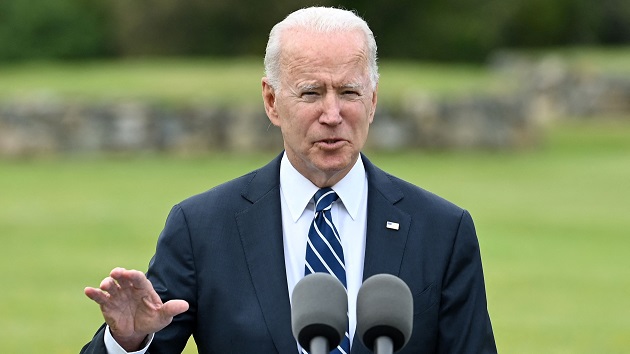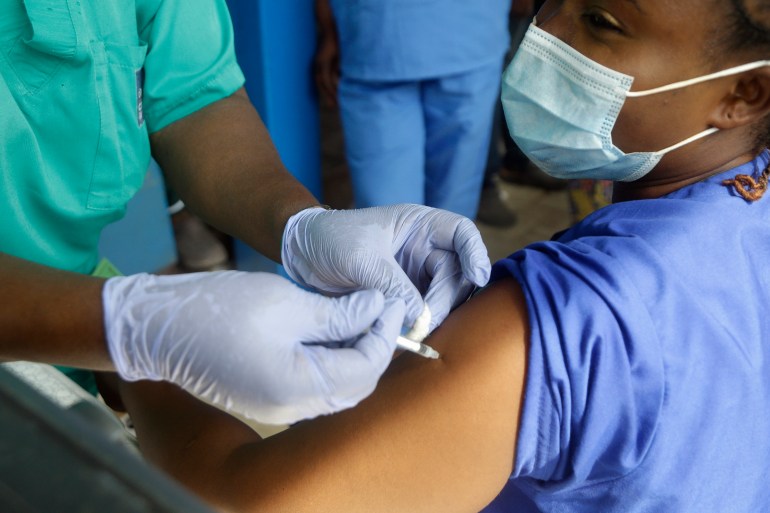
The US president casts plan as bold move that shows the country recognizes its responsibility towards the world.
![US President Joe Biden announced his administration's pledge to donate 500 million doses of the Pfizer coronavirus vaccine to the world's poorest countries [Kevin Lamarque/Reuters]](https://www.aljazeera.com/wp-content/uploads/2021/06/2021-06-10T173637Z_1678585114_RC2M6H9XK2RP_RTRMADP_3_G7-SUMMIT-BIDEN.jpg?resize=770%2C513) US President Joe Biden announced his administration’s pledge to donate 500 million doses of the Pfizer coronavirus vaccine to the world’s poorest countries
US President Joe Biden announced his administration’s pledge to donate 500 million doses of the Pfizer coronavirus vaccine to the world’s poorest countries
United States President Joe Biden has announced a donation of 500 million doses of the Pfizer COVID-19 vaccine to the world’s poorest countries to help speed the pandemic’s end, with “no strings attached”.
Biden – keen to burnish his multilateral credentials on his first foreign trip as leader – on Thursday cast the donation as a bold move that showed the US recognised its responsibility to the world and to its own citizens.
“The United States is providing these half billion doses with no strings attached. No strings attached,” Biden said, speaking alongside Pfizer Chief Executive Albert Bourla in the English seaside resort of Carbis Bay before a G7 summit.
“Our vaccine donations don’t include pressure for favours, or potential concessions. We’re doing this to save lives, to end this pandemic, and that’s it,” he said.
 Shipment of COVID-19 vaccines provided through the COVAX global initiative arriving at the airport in Mogadishu, Somalia
Shipment of COVID-19 vaccines provided through the COVAX global initiative arriving at the airport in Mogadishu, Somalia
The US commitment is to buy and donate 500 million Pfizer doses for distribution through the global COVAX alliance to 92 lower-income countries and the African Union.
Biden had faced mounting pressure to outline his global vaccine sharing plan, especially as inequities in supply around the world have become more pronounced and the demand for shots in the US has dropped precipitously in recent weeks.
“It’s our very strong view that given the lack of coverage around the world it’s absolutely critical to make a big move like this to get more vaccines into the system as quickly as possible,” said Gayle Smith, the global COVID coordinator at the US State Department.
“These vaccines will become available as of August, even as we are pushing out the 80 million doses that have already been announced,” she said during a news conference on Thursday.
Officials said the goal is to distribute 200 million doses by the end of the year. The remaining 300 million doses would be shipped in the first half of 2022.
China has already been offering its vaccines to poorer countries, with hard-hit Brazil and Indonesia among those participating in late stage trials for its Sinovac vaccine, which received World Health Organisation emergency use approval at the beginning of the month. More than 20 countries are now using the jab including Chile, Turkey, Thailand and Malaysia. A second Chinese jab, Sinopharm, also has WHO approval, which means both can be distributed through COVAX.
Coronavirus outbreaks are surging again in many parts of the world where mass vaccination programmes have yet to take off partly because of supply constraints. Experts say the continued spread of the disease will allow the virus to evolve, adding to the risk of variants emerging that are more easily transmissible and more deadly.
COVAX has so far distributed just 81 million doses, and some countries, particularly in Africa, have yet to receive any shipments.
 A woman receiving a vaccine dose at Yaba Mainland hospital in Lagos, Nigeria
A woman receiving a vaccine dose at Yaba Mainland hospital in Lagos, Nigeria
Global vaccine distribution will be among the key issues at the G7 summit, which begins on Friday, with discussions already underway on a $50bn vaccine distribution plan for poorer nations.
British Prime Minister Boris Johnson has said he is seeking a commitment to vaccinate the whole world by the end of 2022, while UK Foreign Secretary Dominic Raab says equitable access to shots through COVAX is essential.
Last week, Biden announced a plan to share 25 million “surplus” vaccine doses. The White House said most of the doses would be channelled to COVAX, while some six million doses would be going directly to countries.
Anti-poverty campaign group Oxfam welcomed Biden’s announcement and called for more to be done to increase the global production of vaccines. “Surely, these 500 million vaccine doses are welcome as they will help more than 250 million people, but that’s still a drop in the bucket compared to the need across the world,” said Niko Lusiani, Oxfam America’s vaccine lead.
“We need a transformation towards more distributed vaccine manufacturing so that qualified producers worldwide can produce billions more low-cost doses on their own terms, without intellectual property constraints,” Lusiani said in a statement.
Biden’s administration last month backed a proposal, brought by India and South Africa, that would temporarily lift intellectual property rights for COVID-19 vaccines. But there has been continued resistance from pharmaceutical companies and some of the countries where they are based.
Medicins Sans Frontieres said the continued spread of COVID-19 made action imperative.
“G7 governments must urgently work with other governments to use all policy options available to facilitate and mandate transparent, unconditional, enforceable and full transfer of technologies of COVID-19 medical tools, particularly vaccines, by companies they host to manufacturers in all regions, and especially in low- and middle-income countries, in order to ensure access for everyone, everywhere,” Dr Christos Christou, the international president of Medicins Sans Frontieres said in a statement.
“It’s time for change, not charity.”
